





LEVITICUS A Child is Born RABBI REUVEN MANN Kosher is Will Amaze You Gossip e Crime & Damage LEVITICUS Looks ey Just Don’t Ma er God & What Else Exists? Saturday April 22 A Rare Cosmic Phenom RABBI RMOSHE BEN-CHAIM
FREE
Just click any icon in this issue





2 | WWW.MESORA.ORG APR. 21, 2023
the
THE JOURNAL ON TORAH THOUGHT
| Please send letters and questions to: Comments@Mesora.org |
3 Letters
RABBI MOSHE BEN-CHAIM
What else exists? Do appearances matter?
5 Slander
RABBI MOSHE BEN-CHAIM
The corruption, the damage and divine intervention.
6 Birth
RABBI REUVEN MANN
Philosophical errors arise during pregnancy and birth. Torah corrects them.
7 Kosher
RABBI MOSHE BEN-CHAIM
God provides astonishing clues that lead us to keen psychological insights.
14 Cosmos
RABBI MOSHE BEN-CHAIM
The rabbis’ blessing teach a new principle realized through the unique phenomenon of Sabbath/New Moon.
DIETARY LAWS |
Bible’s signs for edible animals unveil an amazing insight into the purpose of kosher laws.

Subscriptions are free. To subscribe, send any email to join@mesora.org
We invite feedback at comments@mesora.org
–––––––––––––––––––––––––Articles
LETTERS


God & What Else Exists?
READER: Is God the only non physical existence?

Joseph Blalock, Israel
RABBI: There are many non-physical existences. But God is dissimilar to them—God is dissimilar to everything—as He says, “To whom can you compare Me?” [1] God is not physical, but one should not think God is
somehow similar to other non-physical things; nothing shares anything in common with God. God’s incomparability applies to everything. Other non-physical existences include angels, our souls, wisdom, and laws that govern both the physical and non-physical worlds. But all those are created, while God is eternal. Herein lies the most significant distinction between God and other non-physi-
may be reprinted without consent of the Jewishtimes or the authors, provided the content is not altered and credits are given. WWW.MESORA.ORG APR. 21, 2023 | 3 MESORA
(CONT. ON NEXT PAGE)
RABBI MOSHE BEN-CHAIM
|
a thing is “this” to the exclusion of other properties. That is a limitation.
Angels themselves attest to God’s unique nature: “And one [angel] would call to the other, “Holy, holy, holy! The Lord of Hosts! His presence fills all the earth!” (Isaiah 6:3) Holy means “distinct,” as God is distinct from them. This applies to 3 matters: He is distinct from non-physical existences, from earthly existences, and His distinction is eternal. This is why the word holy is used three times (Targum). God imbues angels with perfect knowledge, and they confess that God is unique.
Thus, as far as man knows, non-physical existence includes God, angels, the soul, wisdom and laws that govern all existences excluding God. Physical existences include all within the universe. If there are any other existences, we do not know of them, as God did not communicate them to us. ■

Do Appearances Matter?
READER: How valuable are external appearances? Do they play a role in one’s relationship with God?
RABBI: King Saul sinned, and God told Samuel to anoint a new king to replace him. They traveled to the house of Jessie: “When they arrived and he saw Eliab, he thought, ‘Surely God’s anointed stands before Him.’ But God said to Samuel, ‘Pay no attention to his appearance or his stature, for I have rejected him. For not as man sees [does God
Apparently, God wanted Samuel to make this error to bring it out into the open so Samuel would perfect himself. Samuel’s error was that he estimated men in part based on appearances. God used this opportunity to correct this character flaw within Samuel.
“I will punish the o cials and the king’s sons, and all who wear strange garments” (Zephania 1:8).
Radak explains:
“[this refers to] people who show themselves to be religious and pious and wear foreign clothing unlike the rest of the nation.”
Radak teachers that the prophet Zephania critiqued a practice still alive today where people dress in a manner di erent than others in order to impress them. But this is egoistical and completely valueless.
The lesson from these two cases is that God cares nothing about appearances, as our many rabbis say [2], “God desires the heart.” It must be obvious to any intelligent person that all God’s asks of man relates to his increased intelligence and to the control of his emotions and improved morality, neither of which have any relationship to his clothing.
Thank you to my friend Haddasah for raising this issue this week. ■
[1] Isaiah 40:18,25
[2] Mishnah Pesachim 10:5
Duties of the Heart (introduction)


Tzavaat HaRivash 1:1
Ibn Ezra, Exodus 31:18
4 | WWW.MESORA.ORG APR. 21, 2023
LETTERS SHARE
slander DESTROYS
his weeks Torah portions (Tazria/Metzora) elaborate on the bodily diseases su ered by people who speak evil about others, people who gossip. We must understand the corruption of evil speech as compared to all our other faults: Why does God punish us—miraculously—with skin diseases? Why are we not miraculously punished for stealing or other sins?
People view speech as a light matter, and not as severe as physical injury or robbery. This dismissal makes it so much easier to commit the crime of gossip and libel, and so much easier to excuse ourselves from any crime. God must wake us up to see the true damage. Maimonides teaches (Hil. Dayos 7:3) that evil speech or gossip is worse than the three cardinal sins of murder, idolatry, and adultery. The reasoning behind this severity is that evil speech contains the corruptions of all three cardinal sins. When we speak evil about another, it is truly character assassination on par with murder. Idolatry is a sin where we attempt to change reality, and we do the same when we speak evil about another person: our attempt is to ruin that person, in our own imagination. And the sin of adultery is unbridled expression of our instincts, which we clearly see expressed in evil speech. Bodily diseases like boils is the final stage of God’s warnings against the slanderer. In His mercy, God first diseases one's home as the first warning. If the sinner does not heed this lesson, God sends the leprosy to his clothing. Finally if the sinner persists and does not repent, God sends leprosy to his body. Now, the person cannot avoid his fault.
Evil speech is irreversible, and can ruin a person’s life in a matter of seconds. The sinner must take two birds where one is killed, and the live one is dipped


in the blood of the other, and let loose over a field. This embodies the bloody speech set loose in the world, which is irreversible. You cannot catch that bloody chirping bird, it is free out in the world. So too is the bloody chirping speech set loose in the world. One has bloodied his friend, and like murder, it is irreversible. Money can be returned and bodily injuries heal, but a bad reputation is a permanent stain.


Be so careful before opening your mouth. Feelings of ego, aggression and revenge all motivate us to “set the world, right” after somebody has wronged us. The Rabbi's were very aware of this, and formulated a blessing at the end of our Shmoneh Essay: “My God, guard my tongue from evil and my lips from speaking slander. And to those who curse me, let my soul be silent, and let my soul be like [worthless] dust to everybody.”
Beware of opening your mouth, for slander only changes the world in your mind, not in reality. And for your momentary instinctual satisfaction, consider that your slander can lead your victim to suicide to escape the shame.
God must be your only concern in life, not the pleasurable ego gratification after slandering one who wronged you. There are a proper methods for correcting a wrong, but slander is not one of them. An incentive to stay silent is that God passes over all the sins of a person who was wronged, and does not retaliate (Rosh Hashanna 17a). But a far superior motivation is using your wisdom and dominating your instincts by recognizing that your objective in life is not competition with others, but of continuously discovering and enjoying God's beautiful wisdom, and drawing close to Him by following His ways. ■

PARSHA SHARE WWW.MESORA.ORG APR. 21, 2023 | 5
Rabbi Moshe Ben-Chaim
A Child is Born
Rabbi Reuven Mann
This week’s Torah reading, Tazria-Metzora, begins with the strictures surrounding the birth of children. This event confers a state of Tumah (ritual impurity) on the mother. The amount of time that must pass before she can become “pure” depends on the gender of the child. It is twice as long for a baby girl as for a boy.
Upon restoring a state of Tahara (ritual purity) the woman must bring a sin o ering (Chatat) and a burnt o ering (Olah). The question arises, what is the rationale for imposing a condition of Tumah on the new parent? It would seem that having a child is a great Mitzvah and cause for celebration. Moreover, why is she obligated to bring sacrifices, especially a sin-o ering which, generally, atones for unintended violations of negative commandments? How does this
apply to one who has just endured the agonies of pregnancy and labor to produce a new child? And why is the duration of the impurity for a girl double that for a boy?
(Parenthetically, we may note that the Torah has no qualms about defining the gender of the child immediately at birth. But, you might ask, what if the little one subsequently decides to define himself/herself in a di erent manner? It seems to be the view of the Torah that Hashem confers the identity of the newborn, according to the classical criteria, and it is not subject to alteration.)

In my opinion, the phenomenon of childbirth is a great Simcha but can have negative connotations. It goes without saying that the parents play a great role in the propagation of the species, but they are not the true creators of the child. The source of our existence is clearly delineated in the Book of Bereishit. “And G-d said, 'Let us make Man in Our image, after our likeness. They shall rule over the fish of the sea, the birds of the sky, and over the animal, the whole earth, and every creeping thing that creeps upon the earth.' So G-d created Man in His image, in the image of G-d created He him; male and female created He them.”
The most fundamental truth of human life is that we owe our existence to a special act of creation. We are unique creatures who possess an animalistic constitution along with a divine soul, which enables us to attain wisdom and moral perfection.

But our egotistical emotions run counter to this reality. Having children is the greatest of man’s accomplishments, and the natural feeling of parents is
that they own the child by virtue of having produced it. Since the woman actually carries and bears the child, this feeling is more pronounced in her. The maternal instinct is the most powerful force known to man. That is why I believe that she becomes “impure” so that she will focus on reorienting her attitude to the child in accordance with the philosophy of the Torah. And that is why she must bring sacrifices in order to obtain “atonement.” It’s not that she has committed any specific sinful act. But the natural state of mind imposed by childbirth is contrary to the Torah ideal and needs to be corrected.
The innate parental emotions must be tempered by the understanding that Hashem is the true “owner” of the child and that our task is to facilitate his attaining the goal for which he was created.
The proper understanding of motherhood was expressed by Chana, mother of Shmuel Hanavi (the Prophet Samuel) when she dedicated his life to the service of Hashem under the tutelage of Eli, the Kohen Gadol. When she brought the child to Eli, she said, “Please, my lord! By your life, my lord, I am the woman who was standing by you here praying to Hashem. This is the child that I prayed for; Hashem granted me my request that I asked of Him. Furthermore, I have dedicated him to Hashem—all the days that he lives he is dedicated to Hashem.”
It would appear that less time is needed for the parental reorientation process when the child is a male. The Parsha states, “On the eighth day, the flesh of his foreskin shall be circumcised.” The Mitzvah of Circumcision is very di cult for the parents, especially the mother, as she can’t bear to see her baby in pain. In fulfilling this commandment, they are putting aside their emotions and a rming that Hashem is the Creator and Master of our lives and those of our children. There exists no similar Mitzvah in the case of a daughter.
Judaism demands that we recognize Hashem as our Creator and that man is fashioned in His image. In order to fulfill this, we must counter the natural flow of pride and sense of accomplishment that accompanies the birth of a child. The parent must resist the temptation to view his o spring as an extension of his ego whose accomplishments will bring him vicarious gratification. Rather, he should be seen as a gift from Hashem who has entrusted us with the holy mission of raising him to “Torah, Chuppah and good deeds”. May we merit to achieve this. Shabbat Shalom. ■

6 | WWW.MESORA.ORG APR. 21, 2023 PARSHA SHARE
KOSHER


More than most laws, kosher is iconic of Jewish observance, and not without cause. Many times in His Torah[1], God commands us to abstain from eating and touching certain creatures. Like all other commands, the benefit in following any law lies in understanding how it perfects us. And as always, God provides clues. The following are God’s words as He concludes the section on permitted and prohibited species:
Do not defile your souls with any loathsome thing that creeps, and do not become contaminated with them and remain contaminated through them. For I am God your God and you shall be sanctified and remain sanctified, for I am sanctified, and do not contaminate your souls with any creeping thing that crawls on the Earth. For I am God who took you out of the land of Egypt in order to be your God, and be sanctified for I am sanctified (Lev. 11:43-45).
God’s objective for us in our abstention from these creatures is to become like Him: “sanctified.” The avoidance of loathsome behavior is a path towards sanctity. But how does this sanctification work? What is “sanctity?” How does eating prohibited animals harm us? More precisely, how does eating physical objects harm our metaphysical souls? Rashi says[2] abstaining from loathsome creatures alone su ced for God to take us out of Egypt. What is Rashi’s point? Why are we also told many times (Lev. chap 11) to additionally “abhor” (shakeitz) those creatures prohibited from our
SHARE WWW.MESORA.ORG APR. 21, 2023 | 7
RABBI MOSHE BEN-CHAIM
PARSHA (CONT. ON NEXT PAGE)
diet? But why isn’t abstention from eating su cient? Oddly, Moses omits this abhorrence when he repeats the section of kosher and non-kosher animals in Deuteronomy 14:3-21. Why this omission?
We can eat literally all vegetation without restriction. But when it comes to animals, certain species are not to be eaten. Why this distinction? And what is significant about “creeping” things that renders it a dominant consideration among prohibited creatures? Finally, what is it about the act of eating per se that is harmful? Other peoples do not follow kosher laws, yet, they have existed as long as we have. Eating non-kosher apparently does not wipe out civilizations.
Deciphering God’s Clues
In Leviticus chapter 11, God o ers us signs that indicate permitted and prohibited animals: fully-split hooves, chewing cud, fins, scales, knees (locusts), multiple legs, belly-crawlers, paws, and things that creep upon the ground. Even the Rabbis say[3] that although in the Torah birds are not signaled by a sign but by species, there is yet a sign relating to their legs. Notably, most signs indicating a species’ kosher and non-kosher status are based on its means of locomotion…an idea worth pondering.
Locomotion & Kosher
What is significant about locomotion? Unlike inanimate vegetation, animate life—beings with locomotion—engenders human identification. We don’t identify with inanimate objects, like plants, rocks, mountains, or oceans. But animals move. This element of animate life awakens in man our identification with that creature. We are drawn to animals and visit zoos. We obtain pets and mourn at their deaths. We develop systems of animal rights, in which, man draws distinctions: killing insects or even reptiles and birds is not met with the same crime as killing dogs or cats. This is because man places greater value on those species with which he identifies greater.


Identification exists with moving creatures, unlike inanimate objects. Signs of prohibited species inhere in their means of locomotion, the feature wherein man identifies.
Kosher is a Barrier
God wishes man to not identify with the prohibited species. By eating snakes, rats, spiders, etc. man breaks the natural barrier of disgust, and dulls his sense of what is to be loathsome. However, God wishes man to preserve this disgust. This is why He created man with this emotion. By preserving our emotion of disgust, our behavior in all areas benefits by these “barriers.” In contrast, people who eat whatever they wish and engage in unbridled lusts, and worse—eat disgusting species—forfeit their purpose as an intelligent being. They are no longer “sanctified.” Sanctified refers to man operating on the highest level humanly possible. This level is when he is most
(CONT. ON NEXT PAGE)
8 | WWW.MESORA.ORG APR. 21, 2023 SHARE
PARSHA
engaged in intellectual pursuits, studying the universe and Torah, as God designed humans to do. Caving to desires without limit, and breaking the barriers of naturally-reviled things, man loses a critical boundary. (As vegetation o ers man no dangers of identification, no restrictions apply. All fruits and vegetation are permitted as they were since Adam the First.)

We now understand that God wishes man to retain certain barriers. The emotion of disgust is dulled by eating/identifying with certain creatures. Rabbi Israel Chait stated that things that creep on the ground remind us of death. Perhaps it is that close proximity to the underground—the grave—that we find abhorrent in these species. This can also explain why God created man upright, unlike most other creatures…distancing us further from the Earth. “Also the world [God] planted in their hearts so man should not discover the matter that God has done from beginning to end” (Koheles 3:11). This verse refers to God’s design of man’s immortality fantasy (Ibid. Ibn Ezra). God does not wish us to be preoccupied with death. Anything that reminds us of the grave is disturbing. These ground-crawling species disgust us due to their association with the ground, with death. This disgust is reinforced through the additional prohibition of contact with their carcasses, possibly bearing out this idea of distancing us from death.
Eating is one of our two primary drives; sex is the other. The rabbis and leading psychologists are in agreement on this. God limits the Jew’s involvement in satisfying these core instincts so we may become accustomed to controlling our instincts. The goal is to enable our intellects to rule our instincts, and ultimately engage in pursuing wisdom, the greatest pleasure. A person who has no limits on his appetitive and sexual activity will find great di culty in advancing, or even engaging his intellect. His pursuit to know God will never be realized. For he will incite cravings that only grow as he feeds them: “Rabbi Yochanan said, ‘There is a small limb in man: starve it and it becomes satiated, feed it and it becomes hungry’” (Succah 52b). Rabbi Yochanan teaches that the more we satisfy the sexual drive, the greater the urge, and thus, less energy is available for fulfilling God’s Torah. This applies to all drives.
Abstaining from lusts and from eating certain creature su ces to control our emotions on one level. By not eating “disgusting” creatures, we break identification with that species, and we additionally maintain the emotion of disgust, which can then be applied to other forbidden areas. God desires we maintain a minimal level of abhorrence in the area of the appetitive drive. Retaining this disgust for certain species, we don’t only control one emotion, but all of our emotions benefit. We will find avoiding detestable behaviors easier since we strengthened our overall emotion of disgust.

By our very nature, we cannot be overindulgent in one area, without our entire emotional makeup sensing this relaxation. This explains why the Jews worshipping the Gold Calf also arose to engage other instincts (Exod. 32:6). The satisfaction of one emotion—idolatry—causes other emotions to seek satisfaction. In contrast, barring instinctual expression—not eating disgusting creatures—controls other emotions.
(CONT. ON NEXT PAGE)
WWW.MESORA.ORG APR. 21, 2023 | 9 SHARE
PARSHA
Increased Mercy
Leviticus 11 categorizes mammals, then fish, then birds. It is interesting that pawed animals are not initially identified in the first group of mammals[4]. Also interesting is that mammals alone are the one group in which we do not find the word “disgusting” (shekketz). Instead, they are called “tammay” or impure. Perhaps this is because God wishes to teach another consideration within kosher laws. One aspect is what we answered: to sustain a barricade of disgust. Another benefit—in abstaining from pawed creatures—is that it engenders mercy. Pawed animals o er man more identification than other creatures. They are more like man: paws closely resemble human hands, our tools of creativity. We even ascribe intelligence to species that express greater tactile dexterity, like monkeys. The more an animal resembles man, the greater the identification. It’s a natural human response. The prohibition to abstain from pawed animals may serve the opposite benefit: to retain a level of mercy towards God’s creatures. Therefore, God also prohibits animals that more closely resemble man. It is then not surprising that our pets are pawed. Our relationship to animals is then twofold: 1) abstention from disgusting creatures to maintain the necessary emotion of abhorrence, 2) to engender mercy toward beings that are not disgusting. Good and bad emotions are thereby kept in check. Therefore, as pawed mammals are not eaten due to a reason di erent from impurity, they are not included in the first mention of impure mammals. God created man to naturally sense a feeling of abhorrence. We could have been designed to find all creatures equally appealing, but God deemed this harmful. He instilled in human nature many emotions, including disgust for many creatures. This disgust may be towards their outer appearance like rats and many insects. We also are designed to revile things that crawl on the ground like snakes and spiders, which recall the grave. God created us with disgust, and additionally commanded the Jew to reinforce this disgust through abstaining from eating or touching many creatures. Disgust is the natural wall between man and his instincts. By abstaining from instinctual gratification according to Torah parameters, God intends that man raise himself to the life where his intellect is not compromised, but rather, free to engage in studying the Creator. This is how man is sanctified, and resembles his Creator. This is Rashi’s point, that the path to living an intelligent life is paved by controlling our instincts. Abstaining from certain species accomplishes this goal, and alone, warranted God’s Egyptian Exodus.

Summary
At first, we wonder at the various species; why are they all needed? What is kosher all about? Is it a health law? But we then appreciate that God permitted us to enjoy flesh in all corners of the Earth, since man is mobile. We travel. God provided food in all regions: land and sea, valleys and mountains. By analyzing the signs that indicate kosher and non-kosher species, we realize they address our rarely

1 0 | WWW.MESORA.ORG APR. 21, 2023 SHARE
PARSHA (CONT. ON NEXT PAGE)
examined emotional makeup. But God teaches us through kosher laws that we must have one eye on our psychological health and strive toward the perfection of our instincts. We also must recognize the species as God’s will and show them mercy, as in sending the mother before taking the young, thereby sparing her pain, and perhaps also via abstaining from eating pawed species. This reinforces the mercy we are to show people. With our emotions in check, abstaining from eating certain species and even going so far to abhor them too, we control our instincts and become in some small way like our perfectly intelligent Creator who is bereft of any human quality and emotion. We too can partake of wisdom, the pursuit that God designed that o ers us the greatest satisfaction.
As Jews, our mission di ers from all other peoples. As teachers of God’s Torah, we must condition our instincts through restraint, allowing our intellects to be untarnished from urges that cloud our thought. In this pristine manner, we can study clearly and accurately teach God’s single system for mankind, in a manner that impresses all who observe us. God’s will that we impress the world with Torah will then be fulfilled, as the nations remark, “What a wise and understanding people is this great nation” (Deut. 4:6).
Addendum
“Do not defile your souls with any loathsome thing that creeps, and do not become contaminated with them and remain contaminated through them. For I am God your God and you shall be sanctified and remain sanctified, for I am sanctified and do not contaminate your souls with any creeping thing that crawls on the Earth. For I am God who took you out of the land of Egypt in order to be your God, and be sanctified for I am sanctified” (Lev. 11:43-45).
Parshas Shmini concludes by clearly identifying the prohibition as “Do not defile your souls with any loathsome thing that creeps” and “do not contaminate your souls with any creeping thing that crawls on the Earth.” Clearly, the prohibition against these species is not to a physical concern, but that our “souls”—our intelligences—should not become compromised through association with death, embodied in creatures that creep on the Earth’s surface close to the place of our graves. Perhaps even the signs in kosher mammals—split hooves—and the signs in kosher fish—fins and scales—cause those creatures to move in a way dissimilar than the non-kosher creeping creatures. We are left with the question of how chewing cud plays a role in this theory.
Addendum II

Why did Moses omit any reference to “shekketz” in Deuteronomy 14:3-21? Perhaps Torah contains 2 sections of kosher laws to address 2 distinct objectives. One objective[1] is to retain a level of disgust, as stated. But when Moses omits that term, he thereby teaches that even without retaining disgust, a restricted diet serves another purpose: distinguishing the Jewish nation, which Moses states just before discussing kosher: “For you are a holy nation to the Lord your God, and you God selected to be a treasured nation from all peoples on the face of the Earth” (Deut. 14:2). Thus, Moses teaches the Jews that even without preserving the emotion of disgust, some level of diet contributes to the Jews’ role as a treasured nation. We are treasured, as we exhibit control over our most base instinct of appetite. Only one who masters his instincts can elevate his intellect and partake of the Chosen People’s role as Torah students and educators of mankind. ■

[1] Exod. 22:30, Lev. chap 11, Deut. 14:3-21.
[2] Lev. 11:45
[3] Tal. Chullin 59a. See the mishna.
[4] Lev. 11:1-8
SHARE WWW.MESORA.ORG APR. 21, 2023 | 1 1
PARSHA
What is the purpose of gematria?

Can we truly learn anything from the numerical representation of words?

What is beneath these creative yet apparently simplistic interpretations?

While jointly pursuing semichah and a PhD in mathematics, it seemed natural for Elie Feder to love gematria. However, he was bothered by these compelling questions. That is, until he discovered the purpose of gematria.
Gematria Refigured presents the discoveries that led to the author’s transformation from a gematria skeptic to a gematria lover. It develops a theory which elucidates how the Torah and Chazal use gematria to direct us toward a very specific type of idea. Through its many examples, this work illustrates how gematria can help us uncover novel insights, while providing interesting and clearly formulated perspectives into many mitzvos, themes, and stories in Tanach.
Buy on Amazon
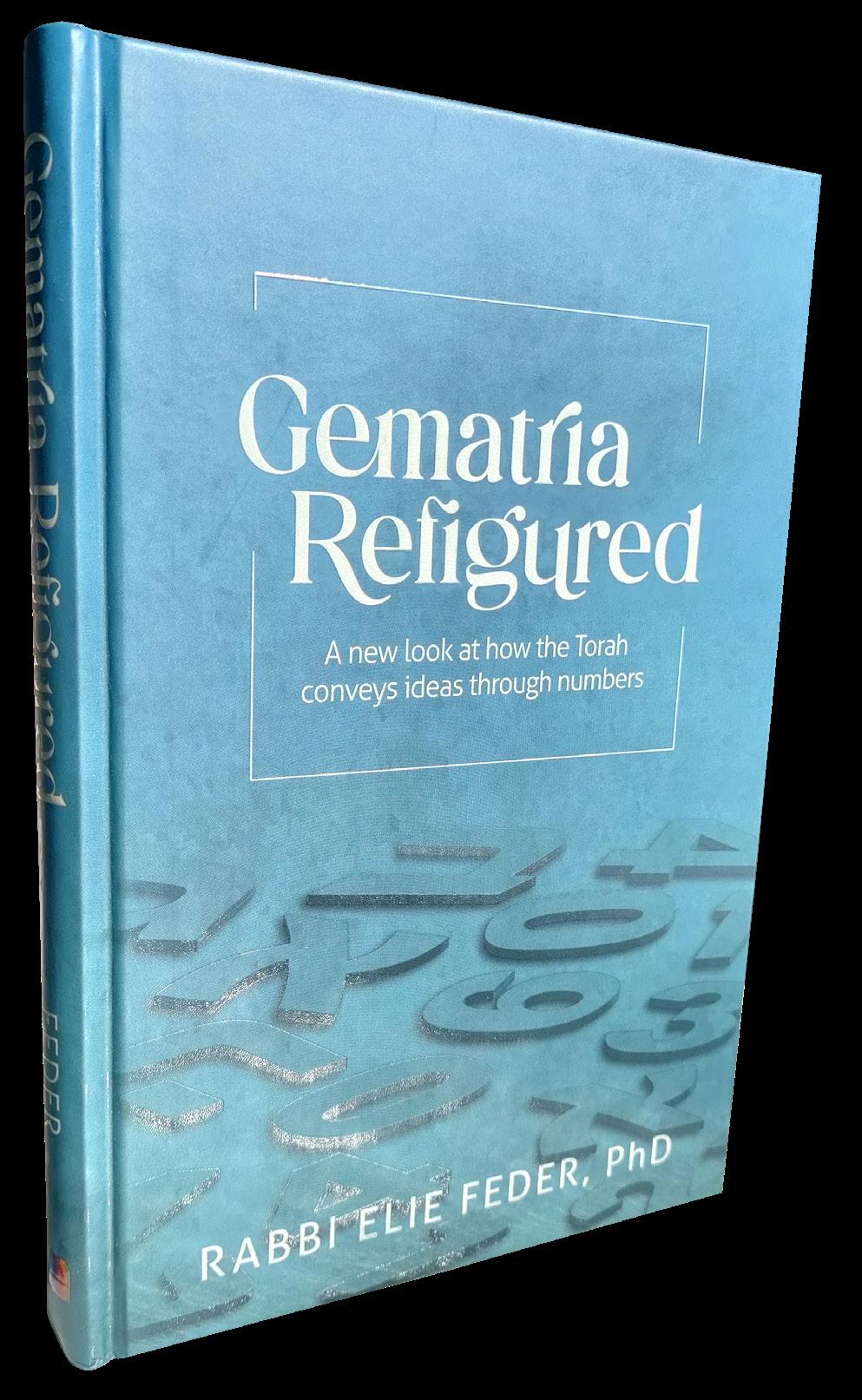
1 2 | WWW.MESORA.ORG APR. 21, 2023
Gematria is a polarizing topic. While many love it, many others view it with skepticism.

WWW.MESORA.ORG APR. 21, 2023 | 1 3 SHARE Designers of the Jewishtimes & Mesora.org Building loyalty and sales through design strategies 516.569.8888 NYDesign.com Branding UI/App Design Wires/Prototypes App Store Design Dataviz/Charts Infographics Iconography Illustration Websites Landing Pages Editorial Design Presentations Social Media Advtg/Promo Animation Packaging WEBSITE
Saturday April 22 A Rare Cosmic Phenom
There exists a notion that religions di er merely quantitatively, for they each have deities, beliefs, practices, holidays and cultures. All elements belong to all religions. While this might be so, uniquely Judaism stands alone. Citing our prophets and greatest thinkers like Maimonides, Rabbi Israel Chait explained how the primary focus of Judaism is not practice, but the appreciation of God’s wisdom in forming the precise and brilliant principles which guide each law. King Solomon stated, “Greater is wisdom than fine pearls; all desirous things do not equate to it” (Proverbs 8:11). Here, King Solomon taught that of the 613 Torah commands, the command to study the Torah outweighs all others. And creation attests to this, as man alone was created with intelligence. God’s purpose in creating the human mind or soul is obviously that man engages his mind as his primary occupation. This o ers man the greatest enjoyment. This is King Solomon’s message.
Equally important to man’s enjoying the greatest delight in life through wisdom, is that Judaism’s mark of distinction is not detected in any other religion. But one should not accept my word alone. To be convinced of this truth, one must personally experience examples of this brilliance.
God entrusted to the rabbis not only to transmit the Torah, but also to erect safeguards, what we call rabbinic laws. They also have the right to formulate blessings. God’s endorsement of the rabbis (Deut. 17:11) conveys to us His assessment of the rabbis’ great minds. Studying the formulation of one of their many blessings enlightens us to Judaism’s mark of distinction.

This Sabbath is the New Moon. On this day, our regular Additional (Musaf) service is altered. Instead of the regular prayer, we recite “You formed Your world

(CONT. ON NEXT PAGE)
1 4 | WWW.MESORA.ORG APR. 21, 2023
RABBI MOSHE BEN-CHAIM
from long ago.” We must ask: Why was this prayer changed on account of the Sabbath/New Moon combination?
Looking at the altered text, we notice the additions of “God’s creation,” and “from long ago.” The first step in approaching this question is to independently define the two days of Sabbath and the New Moon. Afterwards, we can understand what concept their combination highlights.
The Sabbath has the unique distinction of God’s creation of the universe from nothingness, “creation ex nihilo.” All matter was brought into existence and completed, and God refrained from any additional creation from the seventh day and forward. The Rabbis teach (Ethics 5:6) that the miracles throughout time were “programmed” into Creation. God did not enact new changes “in time,” primarily because He is
above time. Maimonides teaches that time itself is also one of God’s creations. We might then ask, if this is so, that Creation was complete, why then do we recite “You formed Your world from long ago” only on the Sabbath/New Moon combination? We should recite it every Sabbath.
What is the New Moon? The New Moon is di erent from the Sabbath. On it, we do not commemorate the completion of a creation, but the completion of the circuit of the Moon. How is the Moon’s circuit di erent than Creation? It too was designed by God!
There is a distinction. Creation, celebrated by the Sabbath, addresses God’s creation of the universe from nothingness. Sabbath addresses the “material” of creation. The New Moon embodies a di erent phenomenon; not the matter of creation, but the

“laws” governing that matter.
God created two things; entities, and laws governing those entities. On the first Sabbath, although all matter was complete, the laws governing their behavior could not be seen in their completion. For example, the Moon’s orbit of the Earth is about 29 days. By definition, on the first Sabbath, the fulfillment of the Moon’s cycle had a few more weeks to go. In truth, all of Creation could not be witnessed on the first Sabbath, as many of God’s laws would not display their complete cycles of behavior for months, and for the planets and stars, even years.
What happens on the Sabbath/New Moon combination?
On this day, both systems coincide, displaying a completion of both; God’s physical creation of entities (Sabbath) and the realization of the universe’s laws (New Moon). On this special day, it is appropriate to
o er this unique praise to God, “You formed Your world from long ago”: formation of the world corresponds to the Sabbath, but “long ago” corresponds to a system, which, although enacted at a prior time, only fulfills its mission much later. “Long ago” is a reference to time, not substance, describing that, which only bears God’s plan after some time, i.e., the laws of Creation. Physical creation can be beheld in a glance, but a system of natural law unfolds its design only after a span of some time.
Both aspects of Creation are witnessed on this special Sabbath/New Moon: Sabbath recalls physical creation, and the new Moon testifies to the realization of God’s natural laws. While it is true that sunrise/sunset can teach this idea of laws, perhaps its frequency and familiarity diminishes its significance in man’s eyes.
(CONT. ON NEXT PAGE) WWW.MESORA.ORG APR. 21, 2023 | 1 5 SHARE
Therefore, the New Moon was selected by the rabbis as the more impressive phenomenon on which to establish praise to God. (I believe this second aspect of Creation, i.e., its laws, are alluded to in Genesis 2:4.)

Through an analysis of this Sabbath/New Moon blessing, we arrive at an appreciation for the ideas behind Judaism; We realize that “ideas” are the focus of Judaism.
Judaism isn’t about performing actions, but about using our minds. Judaism is not about practices that satisfy our emotions like the idolatrous deification of man or sacrifices made of sweet ingredients, thinking God eats as man does. It is not about catering to emotionally-pleasing self-sacrifice like inviting the smiter of our cheek or robber of our wallet to continue, as we masochistically endure the pain. Nor is Judaism about following the imagination, or blind faith in fabricated histories, believing in saints, mysticism, a purported prophet, a religious ceremony bereft of intelligence, or anything without proof.
Judaism is about reality, intelligence and proof.
We don't believe Moses received the Torah on Mt. Sinai; We know it must have happened. For such a stupendous claim would not be transmitted unanimously, had it not occurred. No one in their right mind would swap his true history and instead, lie to himself and his children, telling them that they all attended a miraculous event, when in fact they did not. Not would anyone pass on that lie. This argument applies not to this single person alone, but to the millions who transmitted the identical miraculous account of Revelation at Sinai. We cannot suggest all possessed the same motivation to lie to their children; We cannot accept they would all lie to themselves. Imagine trying to get all 70,000 fans at a baseball game to say the losing Yankees actually won. Imagine trying to get 10 people to lie. The same applies to Sinai. The ancient Jews would not have believed or transmitted a lie. At the very minimum, we should be in possession of the second “true” Jewish history, had Moses in fact lied. But there is no other version of Jewish history.
But one might ask, “Are there not far greater numbers of those believing in Jesus’ purported miracles? Should this not compel conviction?” No, this should not, Why? First, because the accounts of Jesus’ miracles are conflicting. But primarily, the stories of the purported events contain no mass witnesses. That crucial proof of mass witnesses exists in no religion other than Judaism’s history. Christianity merely “believes” Jesus’ accounts, explaining the doctrine of blind faith. But even they do not claim mass witnesses. Thereby the millions of followers are “believers,” not witnesses. And when a story has no witnesses, it o ers no proof.
Judaism’s numerous laws are the glue of the religion, but not the purpose. They give Judaism a cohesive identity that has driven its survival long after the expiration of many other cultures these past 3300 years. But the focus of Judaism is discovering the Creator’s brilliance, explaining why publicizing Creation through the Sabbath is so vital.
The study of Judaism (the Bible) is identical to the study of science, where further discoveries render us awestruck, and simultaneously open vaults of new insights and findings. God layered His wisdom revealed in nature and in the Torah in a hierarchical form; The deeper we dig, the more we discover, and isn’t that too an amazing design?! ■
1 6 | WWW.MESORA.ORG APR. 21, 2023 SHARE
Discover a side of the Bible you never knew existed. Here is a fresh perspective on some of the most lurid, perplexing, and downright fascinating tales in the Bible – stories that are often skipped over in school because they are so di cult to teach. Delve into lesser known details of David and Batsheba's a air. The shocking relationship between Lot and his daughters. Tamar's scandalous seduction of her father-in-law. The tumultuous love a air between Samson and Delilah. But this is not a sensationalized retelling of ancient myths. It is a critical analysis of these narratives through a contemporary lens, weaving together extensive knowledge of tradition and scholarship with a touch of humor.
Challenge your assumptions about what the Bible is and what it has to o er. Don't miss out on the stories that teachers were too afraid to tell you.



Kindle, hardcover and paperback formats. Click below:

Buy on Amazon
WWW.MESORA.ORG APR. 21, 2023 | 1 7
NEW BOOK:
by JESSIE FISCHBEIN
Jessie Fischbein has a great fondness for the nuances in Biblical text and commentaries. She lives with her husband and children in Far Rockaway, within walking distance of her grandchildren and a beautiful beach, which she visits often. She also loves doing backflips and handsprings.
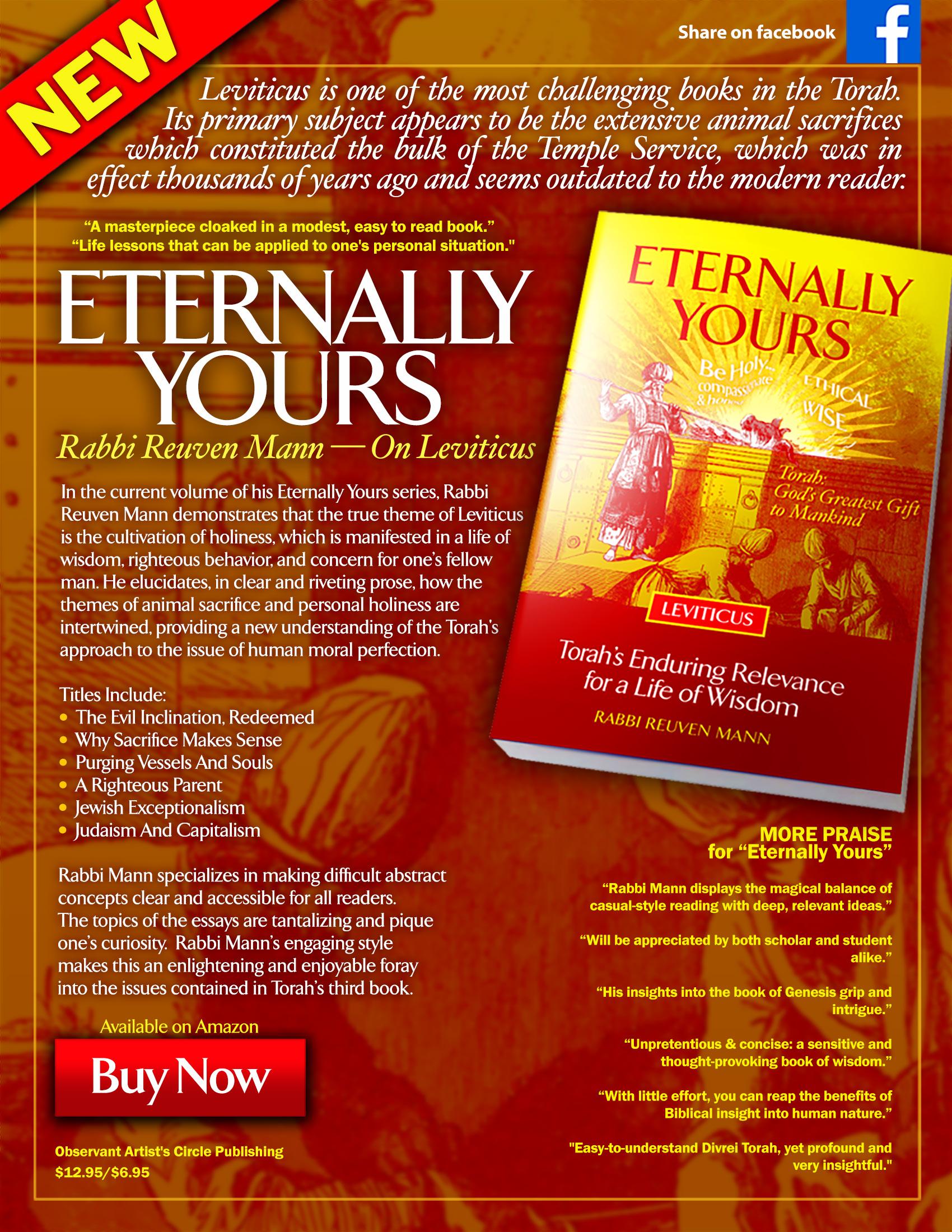
2 MUST READS THIS SPRING
Tohar Hayihud is a masterpiece of intelligent Torah thought. The Rabbi cites authentic Torah sources, Rishonim and great minds who, over the centuries, have rejected Kabbala’s claims as contrary to Torah.
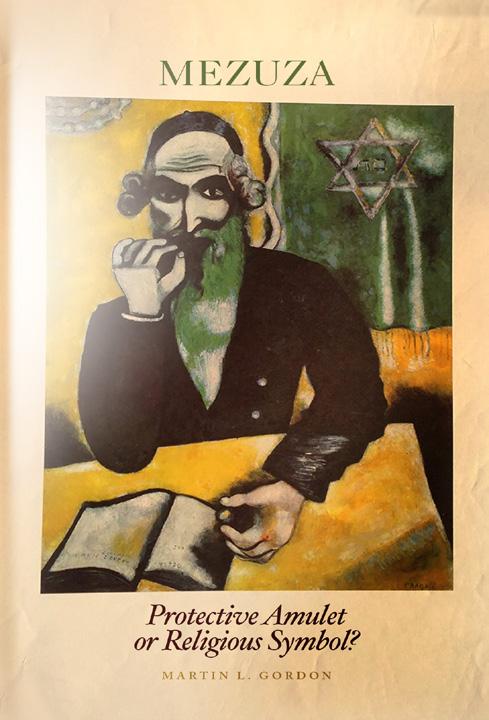
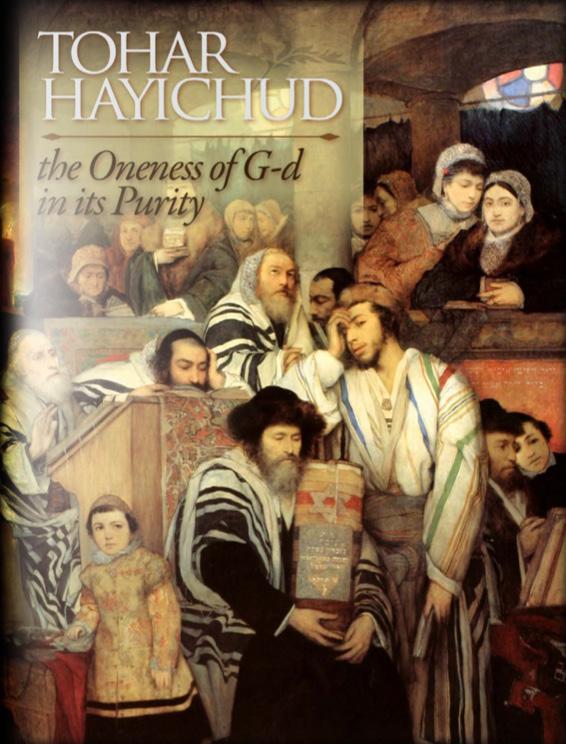
Free to download: www.mesora.org/toharhayihud.pdf
Mezuzah: Protective Amulet or Religious Symbol? addresses the popular belief in segulahs and protective devices. Martin L. Gordon refers to Torah and reason as the authorities on true Jewish concepts.
Free to download: www.mesora.org/mezuza-gordon.pdf
MESORA

WWW.MESORA.ORG APR. 21, 2023 | 1 9
FUNDAMENTALS
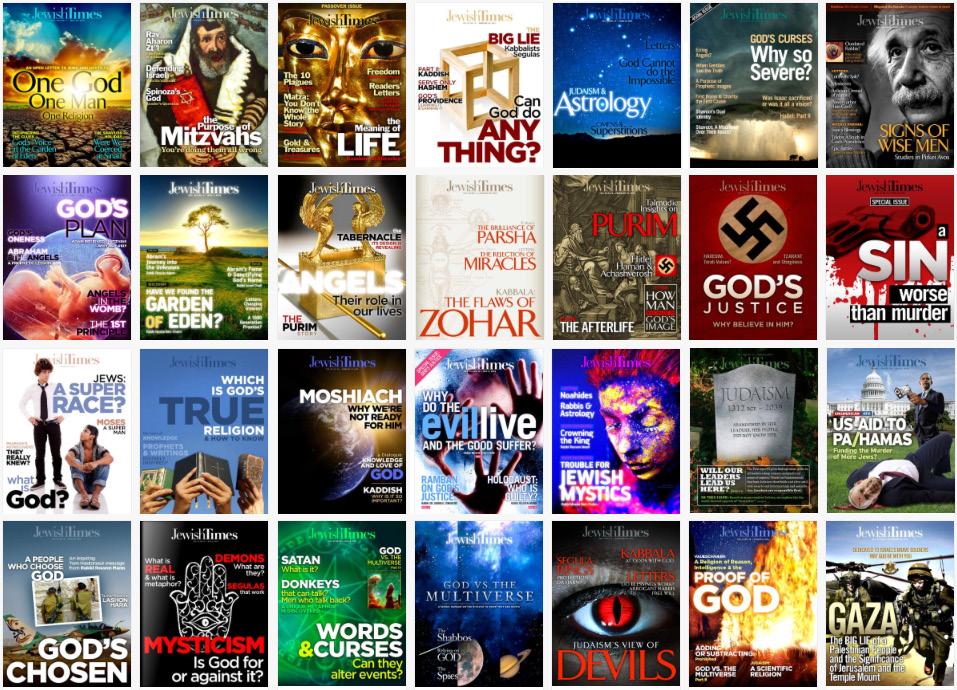
Thought-provoking articles on Torah, Israel, science, politics and readers’ letters. 25 Years. 636 Issues Susbscribe FREE by emaling join@Mesora.org 2 0 | WWW.MESORA.ORG APR. 21, 2023












































